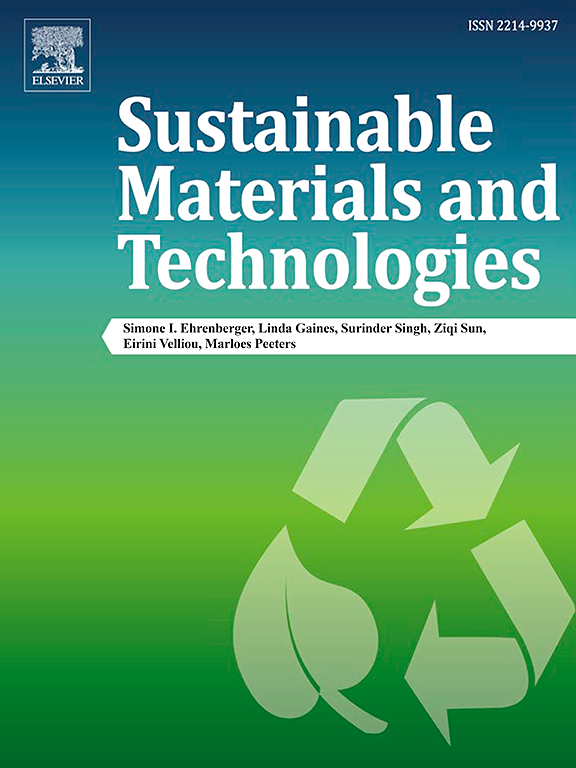Recycling bovine ear tags for phase change material encapsulation via electrospinning
IF 8.6
2区 工程技术
Q1 ENERGY & FUELS
引用次数: 0
Abstract
In this study, thermoplastic polyurethane (TPU) from waste bovine ear tags has been processed and recycled as shell material to encapsulate phase change materials (PCMs), enabling the fabrication of thermoregulating core-shell nanofibers via coaxial electrospinning. Notably, this process was achieved in few steps and without the need for heating equipment to melt the injected materials, enhancing its simplicity. Two PCMs were selected based on their melting points; octadecane (OCTA) near room temperature and eicosane (EICO) near body temperature. Composite fibers were prepared at different core solution concentrations (10, 20, 40 and 80 % w/v), with the highest encapsulation efficiency and thermal properties obtained for samples with 80 % (w/v). TPU/PCM electrospun nanofibers were observed by scanning electron microscopy (SEM) with average diameters between 400 and 700 nm. The Fourier transform infrared spectroscopy (FTIR) suggested no further chemical reactions during the fabrication process. Thermogravimetric analysis (TGA) and differential scanning calorimetry (DSC) demonstrated good thermal stability, with latent heats of 62.9 2 J/g and 81.4 J/g for TPU/OCTA80 and TPU/EICO80 membranes, respectively. Thermal cycling tests were conducted for 150 cycles, showing a 5 % enthalpy reduction in TPU/OCTA80 due to crystalline phase degradation, while TPU/EICO80 exhibited a 2 % increase, likely due to PCM restructuring; however, long-term trends suggest a potential decline. This simple, cost-effective and environmentally friendly fabrication process highlights the potential of upcycling TPU waste and offers a scalable approach for developing TPU/PCM membranes with promising applications in textile thermal management systems.
静电纺丝法回收牛耳标用于相变材料封装
本研究利用牛耳标签中的热塑性聚氨酯(TPU)作为包封相变材料(PCMs)的外壳材料,通过同轴静电纺丝制备了可调节温度的核-壳纳米纤维。值得注意的是,该过程只需几个步骤即可实现,并且不需要加热设备来熔化注入的材料,从而提高了其简单性。根据熔点选择两种PCMs;十八烷(OCTA)接近室温,二十烷(EICO)接近体温。在不同的芯液浓度(10、20、40和80% w/v)下制备复合纤维,当芯液浓度为80% (w/v)时,复合纤维的包封效率和热性能最高。通过扫描电镜观察到TPU/PCM静电纺纳米纤维的平均直径在400 ~ 700 nm之间。傅里叶变换红外光谱(FTIR)表明在制备过程中没有进一步的化学反应。热重分析(TGA)和差示扫描量热分析(DSC)表明TPU/OCTA80和TPU/EICO80膜具有良好的热稳定性,潜热分别为62.9 2 J/g和81.4 J/g。热循环测试进行了150次循环,结果表明,由于晶体相降解,TPU/OCTA80的焓降低了5%,而TPU/EICO80的焓增加了2%,可能是由于PCM重组;然而,长期趋势显示出潜在的下降趋势。这种简单、经济、环保的制造工艺突出了TPU废物升级回收的潜力,并为TPU/PCM膜的开发提供了一种可扩展的方法,在纺织品热管理系统中具有广阔的应用前景。
本文章由计算机程序翻译,如有差异,请以英文原文为准。
求助全文
约1分钟内获得全文
求助全文
来源期刊

Sustainable Materials and Technologies
Energy-Renewable Energy, Sustainability and the Environment
CiteScore
13.40
自引率
4.20%
发文量
158
审稿时长
45 days
期刊介绍:
Sustainable Materials and Technologies (SM&T), an international, cross-disciplinary, fully open access journal published by Elsevier, focuses on original full-length research articles and reviews. It covers applied or fundamental science of nano-, micro-, meso-, and macro-scale aspects of materials and technologies for sustainable development. SM&T gives special attention to contributions that bridge the knowledge gap between materials and system designs.
 求助内容:
求助内容: 应助结果提醒方式:
应助结果提醒方式:


